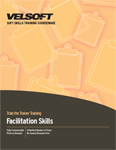Course outline for
Facilitation Skills
Facilitation Skills Course Outline

How to Use This Guide
Session One: Course Overview
Session Two: Defining Your Role
Facilitation, Training, and Chairing
Making Connections
Session Three: How Facilitators Work
Key Skills
Facilitation Skill Levels
Facilitation at a Glance
Session Four: Establishing Ground Rules
Session Five: Content and Process
Session Six: Types of Thinking
Divergent Thinking and Convergent Thinking
Grey Matters
Session Seven: Handling Controversial Issues
Session Eight: Communication Skills
Getting Started
Active Listening
Asking Questions
Non-Verbal Messages
Session Nine: Listening For Common Ground
Session Ten: Common Facilitation Techniques
Top Techniques
Making Connections
Session Eleven: Providing Effective Feedback
Giving Feedback
The Feedback Process
One Step Further
Session Twelve: Managing Divergent Perspectives
Session Thirteen: The Language of Facilitation
Applying the Language
Case Study
Session Fourteen: Building Agendas
Session Fifteen: Dealing with Difficult Dynamics
Mix and Match
12 Easy Ways to Intervene
Session Sixteen: Building Sustainable Agreements
Session Seventeen: Stages of Team Development
The Five Stages
Making Connections
Session Eighteen: Analysis Tools
Recommended Reading List
Post-Course Assessment
Pre- and Post-Assessment Answer Keys
Personal Action Plan
Download this course as a demo
Complete the form below and we'll email you an evaluation copy of this course:
Video
More Course Outlines in this Series
- Advanced Skills for the Practical Trainer
- Developing Your Training Program
- Facilitation Skills
- Survival Skills for the New Trainer
- The Practical Trainer
- Using Activities to Make Training Fun
- Making Training Stick
- Training with Visual Storytelling
- Developing a Training Needs Analysis
- Measuring Training Results
- Developing an eLearning Course
- Mastering Adult Learning Methods
- Exploring Universal Design for Learning
- Developing a Lunch and Learn Program
- Enhanced Learning Experiences with UDL
